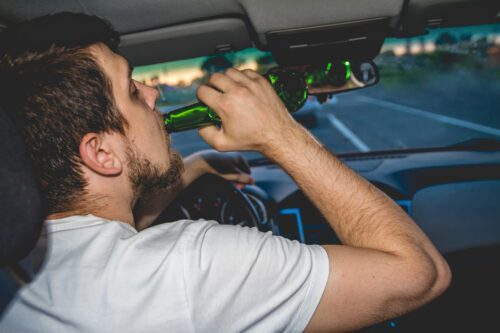
Although Georgia takes driving under the influence seriously, the state has its fair share of drunk-driving accidents. According to the Georgia Governor’s Office of Highway Safety (GGOHS), there were 402 drunk-driving-related traffic fatalities in 2020. Accidents and injuries resulting from drunk driving accidents in the Peach State are far too common.
If a drunk driver causes a car accident that results in your injuries, you may have extensive medical bills, lost pay, and other associated costs. You understand that the drunk driver may be liable for your losses but are unsure how to calculate your case’s value.
Determining damages in a drunk driving accident can be complicated and involves numerous fact-specific factors. Below, the attorneys at MG Law explain damages in a drunk driving case. For questions about your case’s value, contact our attorneys at MG Law today to schedule a free consultation.
Drunk Driving Accident Liability in Georgia
To determine the potential damages in your case, you must first understand the fundamental law involved in drunk driving accident liability. A lawsuit against a drunk driver generally requires you to use the same legal standard of negligence as a typical car accident case. For a claim based on negligence, you must prove the following:
- Duty of care—the driver owes you and others on the road a duty to follow the law, including the duty to drive sober;
- Breach of duty—the driver breaches their duty of care when they drive drunk;
- Causation—the driver’s drunk driving caused the accident; and
- Damages—you suffered damages as a result of the drunk driving accident.
In Georgia, however, if the driver had a blood alcohol level of 0.08 or higher, the law presumes that the driver was negligent. This means you may not necessarily have to prove the above elements under these circumstances.
What Damages Can I Recover for a Drunk Driving Accident Claim?
Many drunk driving accidents lead to devastating injuries. Determining damages in drunk driving accidents will vary from case to case. Generally, you can recover economic and non-economic damages in the aftermath of the collision.
Economic Damages
Economic damages, also known as special damages, are meant to compensate you for the direct monetary losses you endured due to your injuries. Economic damages are quantifiable monetary losses. Economic damages include:
- Lost wages,
- Medical bills,
- Loss of future earning capacity,
- Rehabilitation expenses, and
- Repair costs for property damage.
In most cases, receipts and invoices are the documents that help calculate economic damages, making this a relatively straightforward process.
Non-Economic Damages
Non-economic damages, also known as general damages, are more abstract losses that a victim suffers due to a drunk driving accident. Common types of non-economic damages include losses such as:
- Pain and suffering,
- Loss of quality of life,
- Loss of companionship,
- Mental anguish, and
- Emotional distress.
It is typically harder to calculate non-economic losses due to their abstract nature. They are individualized and fact-specific. An experienced attorney can advise you on the potential non-economic damages in your case.
Punitive Damages
In certain drunk driving cases, a court may award punitive damages. Punitive damages aim to punish the driver and deter similar misconduct in the future. Georgia courts will only impose punitive damages where there is evidence of malice, fraud, or willful or wanton misconduct. Georgia generally caps punitive damages awards at $250,000.
How to Help Secure Fair Compensation in a Drunk Driving Lawsuit
You cannot waste time in the aftermath of a drunk driving accident. If you do not act quickly, the evidence to prove your claim could diminish or disappear altogether. We know that no one starts their day expecting to be in a drunk driving accident. Thus, we prepared a short guide of what you should do after your accident to maximize your settlement value.
Report Your Accident
You should contact the police immediately after a car accident, especially if you suspect the other driver is under the influence. When you report an accident to law enforcement, they will create a formal accident report. This accident report will likely include the following:
- The names of the parties involved,
- The names of the car insurance carriers, and
- The officer’s opinion of who caused the accident.
If the at-fault driver is drunk, they may be arrested at the scene. Criminal liability does not automatically mean you will prevail in your personal injury case. However, proof of criminal liability may help your lawyer prove the at-fault party was negligent.
Gather Evidence from the Scene
When you are involved in a drunk driving accident, the conditions at the scene change immediately after all the dust settles. You can collect the best information about the scene in the moments right after the collision. Evidence that can be helpful after an accident includes:
- Photos of the location of the accident,
- Names and contact information for any eyewitnesses, and
- Surveillance footage from nearby stores or other cameras.
This information can help bolster your case and maximize your chances of financial recovery.
Be Careful When Talking to Insurance Representatives
Although you may have to file a claim with the drunk driver’s insurance company, keep your statements to the insurance company to the basic facts. Be very careful about anything you say to them. Remember, they will probably try to use your statements against you later to avoid paying your damages.
A representative may contact you right after the crash to make a settlement offer. Do not accept a low-ball settlement offer right off the bat. Instead, let a skilled personal injury lawyer review their offer and see if it truly compensates you for your losses.
When you hire a lawyer at MG Law, you can tell the insurance company to contact us instead. We can review their offer and negotiate the claim to work toward getting you the compensation you deserve.
Do You Have Questions About Damages in a Drunk Driving Crash? Contact Our Lawyers at MG Law Today
If you or a family member has been injured in a drunk driving accident, you need attorneys dedicated to fighting for victims of someone else’s negligence. The founding attorney at MG Law, Michael Geoffroy, is committed to holding drunk drivers accountable when they inflict injuries on innocent parties. Michael has received numerous accolades for his outstanding legal expertise, such as being named Top 40 Under 40 and holding a 10.0 rating on Avvo. Our team at MG Law values leadership, service, and problem-solving. We strive to provide all of our clients with the highest level of service and advocacy from the beginning of their case to the end. Contact our office today to talk to one of our lawyers.

